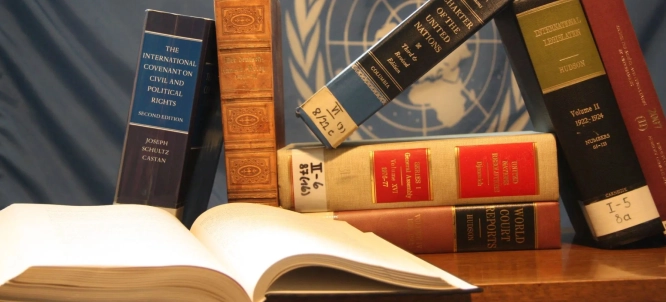by PushtoLearn
Unit 1 - The practice of Law
Table of Contents
Unit 1, International Legal English Exercises and Flashcards
These exercises focus on Unit 1, International Legal English
Wordlist for Unit 1, International Legal English
|
Word |
Definition |
Example |
|
civil law |
A legal system based on written laws and codes that prescribe how disputes are resolved between individuals or entities |
In civil law systems, disputes between individuals or entities are resolved through legal proceedings |
|
common law |
A legal system where precedent, past judicial decisions, plays a significant role in shaping and interpreting the law, alongside statutes and regulations |
Common law systems rely heavily on judicial precedent to make legal decisions |
|
criminal law |
The branch of law that deals with offenses against the state or society, typically involving prosecution by the government and potential imprisonment or fines |
Criminal law deals with offenses against the state and defines what actions are considered crimes |
|
based on |
To rely on or derive from a particular source or foundation |
The decision was based on established legal principles |
|
bound by |
Legally obligated or restricted by a contract, law, or obligation |
As a citizen, you are bound by the laws of your country |
|
codified |
To compile and arrange laws or rules into a systematic and organized code |
The country's constitution is a codified document that outlines its fundamental laws |
|
custom |
Established practices and traditions that influence legal principles but may not be written in formal laws or codes |
Customary law often varies from one region to another |
|
disputes |
Conflicts or disagreements, often legal in nature, that require resolution through a legal process |
Legal disputes are common in contract law cases |
|
legislation |
Laws enacted by a legislative body, such as a parliament or congress |
The new legislation introduced stricter penalties for certain offenses |
|
non-criminal |
Pertaining to actions or matters that are not considered criminal offenses |
This civil case involves non-criminal matters |
|
precedent |
Previous court decisions that serve as examples or guidance for current and future cases with similar issues |
The judge cited several legal precedents to support the decision |
|
provision |
Specific clauses or sections within a legal document or law that outline particular rules or requirements |
The contract contains provisions for resolving disputes |
|
ruling |
Official decisions or judgments made by a court or authority on a particular legal matter |
The Supreme Court's rulings set important legal precedents |
|
directive |
A legal instrument issued by an authority or government that directs specific actions or objectives to be followed |
The government issued a directive to address the issue |
|
ordinance |
A local law or regulation enacted by a municipal or local government |
The city council passed an ordinance prohibiting street parking |
|
statute |
A formal written law enacted by a legislative body, typically at the national or state level |
The statute prohibits discrimination on various grounds |
|
regulation |
Detailed rules and requirements established by a government agency to implement laws or statutes |
Government agencies often create regulations to enforce laws |
|
bill |
A proposed law presented to a legislative body for consideration and debate before becoming a statute |
The bill is currently in the legislative process |
|
stipulate that |
To specify or include a particular requirement, condition, or provision in a legal document or agreement |
The contract stipulates that payments must be made monthly |
|
provide that |
To state or include a specific provision or requirement within a legal document or law |
The law provides that all citizens have equal rights |
|
specify that |
To explicitly mention or detail a particular condition, requirement, or aspect within a legal context |
The lease agreement specifies that pets are not allowed |
|
state |
To express or formally declare something in a clear and definitive manner, often within a legal document |
The witness stated that he had not seen the woman before |
|
set forth |
To present or outline information, rules, or provisions in a structured and organized manner |
The contract sets forth the terms and conditions of the agreement |
|
determine |
To decide or establish a particular outcome or course of action based on legal principles or authority |
The court will determine whether the defendant is guilty |
|
lay down |
To establish, prescribe, or set forth rules, regulations, or requirements in a formal manner |
The regulations lay down the rules for environmental protection |
|
prescribe that |
To mandate or require something as a rule or obligation within a legal context |
The law prescribes that all vehicles must have insurance |
|
appellate court (or court of appeals, appeals court) |
A higher court that reviews decisions made by lower courts and has the authority to uphold, overturn, or modify those decisions |
If you disagree with the lower court's decision, you can appeal to the appellate court |
|
crown court |
A court in the United Kingdom that hears serious criminal cases and some civil cases |
Serious criminal cases are typically heard in the crown court |
|
high court (or supreme court) |
The highest court in a jurisdiction, typically responsible for reviewing important legal issues and appeals |
The high court has the authority to hear complex legal cases |
|
juvenile court |
A court specialized in handling cases involving minors or juveniles, often focusing on rehabilitation and support |
Juvenile court handles cases involving minors |
|
lower court (or court of first instance) |
A court of original jurisdiction where legal cases are initially heard and decided |
Most legal matters start in the lower court |
|
magistrates' court |
A lower court in some jurisdictions that deals with minor criminal offenses and certain civil matters |
Minor criminal cases are often heard in magistrates' courts |
|
moot court |
A simulated court where law students practice their advocacy skills and argue hypothetical cases for educational purposes |
Law students practice their advocacy skills in moot court |
|
small-claims court |
A specialized court that handles small-scale civil disputes with simplified procedures, typically without lawyers |
Small-claims court is for resolving minor disputes |
|
tribunal |
A specialized judicial body established to resolve specific types of disputes, often outside the regular court system |
The employment tribunal will hear the discrimination case |
|
defendant |
The party in a legal case against whom a claim or charge is made, who is required to defend against the allegations |
The defendant denied the allegations in court |
|
judge |
A legal official who presides over and makes decisions in a court of law |
The judge presided over the trial |
|
claimant |
The party in a legal case who initiates the lawsuit by making a claim or allegation against another party |
The claimant seeks compensation for damages |
|
advocate |
A legal professional who represents clients in court proceedings and provides legal advice and support |
The defense advocate presented a strong argument |
|
clerk |
An administrative assistant in a court who manages documents, schedules, and other administrative tasks |
The court clerk maintained the case records |
|
bailiff |
An officer of the court responsible for maintaining order in the courtroom and executing court orders |
The bailiff maintains order in the courtroom |
|
reasonably prudent person |
A legal standard that refers to how an average, rational person would act or behave in a given situation |
A reasonably prudent person would exercise caution in such a situation |
|
affidavit |
A sworn written statement of facts made voluntarily and confirmed under oath, often used as evidence in legal proceedings |
The witness signed an affidavit to confirm their testimony |
|
answer |
A written response filed by a defendant in a civil case, addressing the allegations made in the plaintiff's complaint |
The defendant must file an answer to the complaint |
|
brief |
A written legal document submitted to a court that presents arguments, legal points, and supporting evidence in a case |
The legal brief summarizes the key arguments |
|
complaint |
The initial legal document filed by a plaintiff that outlines the allegations and the basis for a lawsuit |
The plaintiff filed a complaint against the company |
|
injunction |
A court order that requires a party to do or refrain from doing a specific action, typically to prevent harm or enforce rights |
The court issued an injunction to halt construction |
|
motion |
A formal request made by a party to a court, seeking a specific action or decision on a legal matter |
The attorney filed a motion to dismiss the case |
|
notice |
Formal communication or notification, often used to inform parties involved in a legal process of important information |
The notice informed the tenant of the eviction |
|
pleading |
Formal written statements filed by the parties in a lawsuit, including the complaint, answer, and other legal documents |
The pleading outlines the plaintiff's claims |
|
writ |
A written order or command issued by a court or other authority, often used to compel a specific action |
The writ orders the sheriff to seize the property |
|
to draft a document |
To compose or create a written legal document, such as a contract, agreement, or legal brief |
The lawyer will draft a legal document for the client |
|
to issue a document |
To officially release or distribute a legal document, often through a court or governmental authority |
The court will issue a summons to the defendant |
|
to file a document with an authority |
To submit a legal document to an official entity or organization, often for the purpose of record-keeping or legal compliance |
The company must file its financial statements with the regulatory authority |
|
to serve a document on someone |
To deliver or provide a legal document to a specific individual or party involved in a legal matter |
The process server will serve the lawsuit papers on the defendant |
|
to submit a document to an authority |
To formally present or deliver a legal document to an official or governing body for review or processing |
The applicant must submit the permit application to the municipal authority |
|
bar |
The legal profession or community, including lawyers and attorneys |
The legal bar association provides support to lawyers |
|
corporate |
Related to businesses and corporations, often used in the context of corporate law |
Corporate law governs the activities of businesses |
|
defense |
The party or legal argument that opposes the claims or charges made by the plaintiff or prosecution |
The defense attorney represents the accused |
|
government |
The governing body or authority responsible for making and enforcing laws and regulations in a jurisdiction |
Government agencies enforce laws and regulations |
|
patent |
A legal protection granted by the government to inventors, giving them exclusive rights to their inventions for a certain period |
The inventor applied for a patent for the new technology |
|
practitioner |
A professional who practices in a specific field, such as law or medicine |
The legal practitioner specializes in family law |
|
public sector |
Government-owned or operated organizations and services, as opposed to the private sector |
Public sector employees work for government agencies |
|
sole practitioner |
A lawyer or professional who operates independently without partners or associates in their practice |
The lawyer operates as a sole practitioner |
|
tax |
A financial obligation imposed by a government on individuals and businesses to fund public services and programs |
Tax law determines how individuals and businesses pay taxes |
|
trial |
A formal legal proceeding in which evidence is presented, and a judge or jury makes a decision on the case's outcome |
The trial will begin next week in the criminal court |

FAQ: The Practice of Law
What is the difference between civil law and common law?
Civil law relies on codified statutes and regulations as the primary source of law, while common law is based on judicial precedents established by court rulings. Understanding this distinction helps clarify how laws are applied in different jurisdictions.
What does it mean when a law is "codified"?
A codified law is formally written and organized into a systematic collection, such as statutes or legal codes. Codification ensures consistency and accessibility in legal reference.
How is a "statute" different from a "regulation"?
A statute is a law passed by a legislative body, while a regulation is a rule issued by an administrative authority to implement or enforce the statute. Both are essential in shaping how laws function in practice.
What are "precedents" in the legal system?
Precedents are previous court rulings that guide future cases. They are crucial in common law systems, where judicial decisions help shape the interpretation of laws.
What is the role of an appellate court?
An appellate court reviews decisions made by lower courts to ensure that the law was applied correctly. It does not re-try cases but evaluates legal errors or procedural issues.
How do practitioners "serve a document" on someone?
Serving a document involves delivering legal paperwork, such as notices or summonses, to the relevant party to ensure they are officially informed of legal proceedings.
What is the significance of "moot court"?
Moot court is a simulated court experience often used in legal education to help students practice presenting cases and formulating arguments, preparing them for real-world legal practice.
What does "reasonably prudent person" mean in legal terms?
This term refers to a hypothetical individual who exercises ordinary care and judgment in a given situation. It is often used to assess negligence or liability in legal cases.

